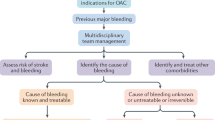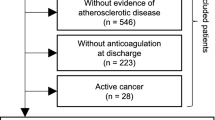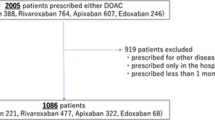Abstract
Atrial fibrillation (AF) is a major cause of stroke and thromboembolism, resulting in substantial morbidity and mortality. For the majority of patients with AF, aspirin has a limited role in stroke prevention, being an inferior strategy and not necessarily safer than the anticoagulant warfarin, especially in the elderly. Novel oral anticoagulant drugs, such as oral direct thrombin inhibitors and oral factor Xa inhibitors, might further diminish the role of aspirin for stroke prevention in AF. Nonetheless, aspirin use should continue in the early stages following presentation of a patient with AF and acute coronary syndrome, and after stenting, in combination with oral anticoagulant drugs and clopidogrel, as appropriate. Notably, aspirin combined with clopidogrel shows only modest benefit in stroke prevention compared with aspirin monotherapy in patients with AF who refuse oral anticoagulant drugs (including warfarin), or in those individuals who have difficulties in anticoagulation monitoring, and can be used where bleeding risk is not excessive.
This is a preview of subscription content, access via your institution
Access options
Subscribe to this journal
Receive 12 print issues and online access
$209.00 per year
only $17.42 per issue
Buy this article
- Purchase on Springer Link
- Instant access to full article PDF
Prices may be subject to local taxes which are calculated during checkout

Similar content being viewed by others
References
Camm, A. J. et al. Guidelines for the management of atrial fibrillation: The Task Force for the Management of Atrial Fibrillation of the European Society of Cardiology (ESC). Eur. Heart J. 31, 2369–2429 (2010).
Hart, R. G., Pearce, L. A. & Aguilar, M. I. Meta-analysis: antithrombotic therapy to prevent stroke in patients who have nonvalvular atrial fibrillation. Ann. Intern. Med. 146, 857–867 (2007).
Go, A. S. et al. Anticoagulation therapy for stroke prevention in atrial fibrillation: how well do randomized trials translate into clinical practice? JAMA 290, 2685–2692 (2003).
Watson, T., Shantsila, E. & Lip, G. Y. Mechanisms of thrombogenesis in atrial fibrillation: Virchow's triad revisited. Lancet 373, 155–166 (2009).
Eckman, M. H., Singer, D. E., Rosand, J. & Greenberg, S. M. Moving the tipping point: the decision to anticoagulate patients with atrial fibrillation. Circ. Cardiovasc. Qual. Outcomes 4, 14–21 (2011).
The Stroke Prevention in Atrial Fibrillation Investigators. Stroke Prevention in Atrial Fibrillation Study. Final results. Circulation 84, 527–539 (1991).
The Stroke Prevention in Atrial Fibrillation Investigators. A differential effect of aspirin in prevention of stroke on atrial fibrillation. J. Stroke Cerebrovasc. Dis. 3, 181–188 (1993).
Aguilar, M. & Hart, R. Antiplatelet therapy for preventing stroke in patients with non-valvular atrial fibrillation and no previous history of stroke or transient ischemic attacks. Cochrane Database of Systematic Reviews, Issue 4. Art. No.: CD001925. doi:10.1002/14651858.CD001925.pub2 (2005).
Serebruany, V. L. et al. Analysis of risk of bleeding complications after different doses of aspirin in 192,036 patients enrolled in 31 randomized controlled trials. Am. J. Cardiol. 95, 1218–1222 (2005).
ACTIVE Writing Group of the ACTIVE Investigators et al. Clopidogrel plus aspirin versus oral anticoagulation for atrial fibrillation in the Atrial fibrillation Clopidogrel Trial with Irbesartan for prevention of Vascular Events (ACTIVE W): a randomised controlled trial. Lancet 367, 1903–1912 (2006).
ACTIVE Investigators et al. Effect of clopidogrel added to aspirin in patients with atrial fibrillation. N. Engl. J. Med. 360, 2066–2078 (2009).
Connolly, S. et al. Apixaban in patients with atrial fibrillation. N. Engl. J. Med. 364, 806–817 (2011).
Mant, J. et al. Warfarin versus aspirin for stroke prevention in atrial fibrillation in the elderly community population: the Birmingham Atrial Fibrillation Treatment of the Aged Study (BAFTA), a randomised controlled trial. Lancet 370, 493–503 (2007).
Rash, A. et al. A randomised controlled trial of warfarin versus aspirin for stroke prevention in octogenarians with atrial fibrillation (WASPO). Age Ageing 36, 151–156 (2007).
van Walraven, C. et al. Effect of age on stroke prevention therapy in patients with atrial fibrillation: the atrial fibrillation investigators. Stroke 40, 1410–1416 (2009).
Healey, J. S. et al. Risks and benefits of oral anticoagulation compared with clopidogrel plus aspirin in patients with atrial fibrillation according to stroke risk: the atrial fibrillation clopidogrel trial with irbesartan for prevention of vascular events (ACTIVE-W). Stroke 39, 1482–1486 (2008).
Gorin, L. et al. Antithrombotic treatment and the risk of death and stroke in patients with atrial fibrillation and a CHADS2 score=1. Thromb. Haemost. 103, 833–840 (2010).
Lee, B. H. et al. The effect and safety of the antithrombotic therapies in patients with atrial fibrillation and CHADS score 1. J. Cardiovasc. Electrophysiol. 21, 501–507 (2010).
Sato, H. et al. Low-dose aspirin for prevention of stroke in low-risk patients with atrial fibrillation: Japan Atrial Fibrillation Stroke Trial. Stroke 37, 447–451 (2006).
Fowkes, F. G. et al. Aspirin for prevention of cardiovascular events in a general population screened for a low ankle brachial index: a randomized controlled trial. JAMA 303, 841–848 (2010).
Ogawa, H. et al. Low-dose aspirin for primary prevention of atherosclerotic events in patients with type 2 diabetes: a randomized controlled trial. JAMA 300, 2134–2141 (2008).
Belch, J. et al. The prevention of progression of arterial disease and diabetes (POPADAD) trial: factorial randomised placebo controlled trial of aspirin and antioxidants in patients with diabetes and asymptomatic peripheral arterial disease. BMJ 337, a1840 (2008).
Antithrombotic Trialists' Collaboration. Collaborative meta-analysis of randomised trials of antiplatelet therapy for prevention of death, myocardial infarction, and stroke in high risk patients. BMJ 324, 71–86 (2002).
Lane, D. A., Kamphuisen, P. W., Minini, P., Büller, H. R. & Lip, G. Y. Bleeding risk in atrial fibrillation patients: The AMADEUS study. Chest 140, 146–155.
Leon, M. B. et al. A clinical trial comparing three antithrombotic-drug regimens after coronary-artery stenting. Stent Anticoagulation Restenosis Study Investigators. N. Engl. J. Med. 339, 1665–1671 (1998).
Lip, G. Y. et al. Management of antithrombotic therapy in atrial fibrillation patients presenting with acute coronary syndrome and/or undergoing percutaneous coronary intervention/stenting. Thromb. Haemost. 103, 13–28 (2010).
Lip, G. Y. et al. Bleeding risk assessment and management in atrial fibrillation patients: a position document from the European Heart Rhythm Association, endorsed by the European Society of Cardiology Working Group on Thrombosis. Europace 13, 723–746 (2011).
Hansen, M. L. et al. Risk of bleeding with single, dual, or triple therapy with warfarin, aspirin, and clopidogrel in patients with atrial fibrillation. Arch. Intern. Med. 170, 1433–1441 (2010).
van Staa, T. P., Setakis, E., Di Tanna, G. L., Lane, D. A. & Lip, G. Y. A comparison of risk stratification schemes for stroke in 79,884 atrial fibrillation patients in general practice. J. Thromb. Haemost. 9, 39–48 (2011).
Olesen, J. B. et al. Validation of risk stratification schemes for predicting stroke and thromboembolism in patients with atrial fibrillation: nationwide cohort study. BMJ 42, d124 (2011).
Boriani, G. et al. Improving stroke risk stratification using the CHADS2 and CHA2DS2-VASc risk scores in paroxysmal atrial fibrillation patients by continuous arrhythmia burden monitoring. Stroke 42, 1768–1770 (2011).
Cairns, J. A. et al. Canadian Cardiovascular Society atrial fibrillation guidelines 2010: prevention of stroke and systemic thromboembolism in atrial fibrillation and flutter. Can. J. Cardiol. 27, 74–90 (2011).
Author information
Authors and Affiliations
Ethics declarations
Competing interests
Gregory Y. H. Lip was clinical adviser to the UK National Institute of Clinical Excellence guidelines on atrial fibrillation management, and a member of the Task Force that wrote the 2010 European Society of Cardiology guidelines. He is currently Deputy Editor ('content expert') for the 9th American College of Chest Physicians guidelines on antithrombotic therapy in atrial fibrillation. He has been a consultant or speaker for the following companies: Astellas Pharma, AstraZeneca, Bayer, Biotronik, Boehringer Ingelheim, Bristol-Myers Squibb, Daiichi Sankyo, Merck, Pfizer, Portola Pharmaceuticals, and Sanofi. Additionally, he has received grant or research support from Bayer and Sanofi.
Rights and permissions
About this article
Cite this article
Lip, G. The role of aspirin for stroke prevention in atrial fibrillation. Nat Rev Cardiol 8, 602–606 (2011). https://doi.org/10.1038/nrcardio.2011.112
Published:
Issue Date:
DOI: https://doi.org/10.1038/nrcardio.2011.112
This article is cited by
-
Real world time trends in antithrombotic treatment for newly diagnosed atrial fibrillation in China: reports from the GLORIA-AF Phase III registry
Thrombosis Journal (2023)
-
Therapeutic management of ischemic stroke
Naunyn-Schmiedeberg's Archives of Pharmacology (2023)
-
Underutilization of anticoagulants in patients with nonvalvular atrial fibrillation in the era of non-vitamin K antagonist oral anticoagulants
International Journal of Arrhythmia (2022)
-
Mendelian randomization study on atrial fibrillation and cardiovascular disease subtypes
Scientific Reports (2021)
-
Understanding the barriers to using oral anticoagulants among long-term aspirin users with atrial fibrillation – a qualitative study
BMC Health Services Research (2020)



